Key takeaways:
- Understanding the atmosphere and layout of nightclub venues is crucial for enhancing audience experience and social interaction.
- Constructive critiques from seasoned DJs are invaluable for skill development and crowd engagement, emphasizing the importance of feedback in the music journey.
- Learning from experienced DJs encompasses observing crowd dynamics and personal storytelling in performances, which can reshape one’s artistic vision.
- Embracing feedback fosters personal growth, prompting DJ’s to evolve creatively and improve their live performances.
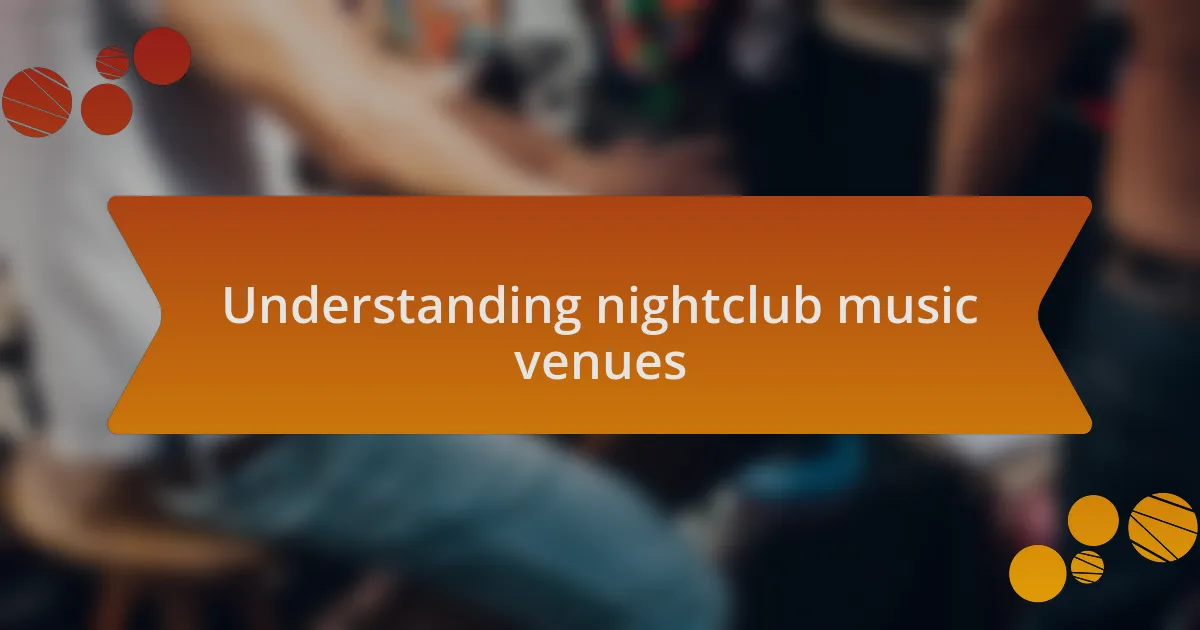
Understanding nightclub music venues
Nightclub music venues are fascinating spaces that blend energy, creativity, and community. When I first stepped into a vibrant nightclub, I remember feeling an electric atmosphere—the bass vibrating through my chest as the DJ spun tracks that felt both familiar and exhilarating. Have you ever wondered what makes a good nightclub truly immersive?
Every nightclub has its unique flavor, from the lighting design to the acoustics, which can significantly influence the audience’s experience. For instance, I witnessed a brilliant DJ once seamlessly weaving together various genres, and the crowd responded with pure euphoria. It made me realize how crucial these elements are; they set the stage for unforgettable memories.
The layout of a nightclub also plays a vital role in its success. I never thought much about this until I noticed how a well-placed bar can encourage social interaction. It gets me thinking—how can the design bring people together in ways that enhance their night out? The answers lie in how we understand and appreciate these venues.
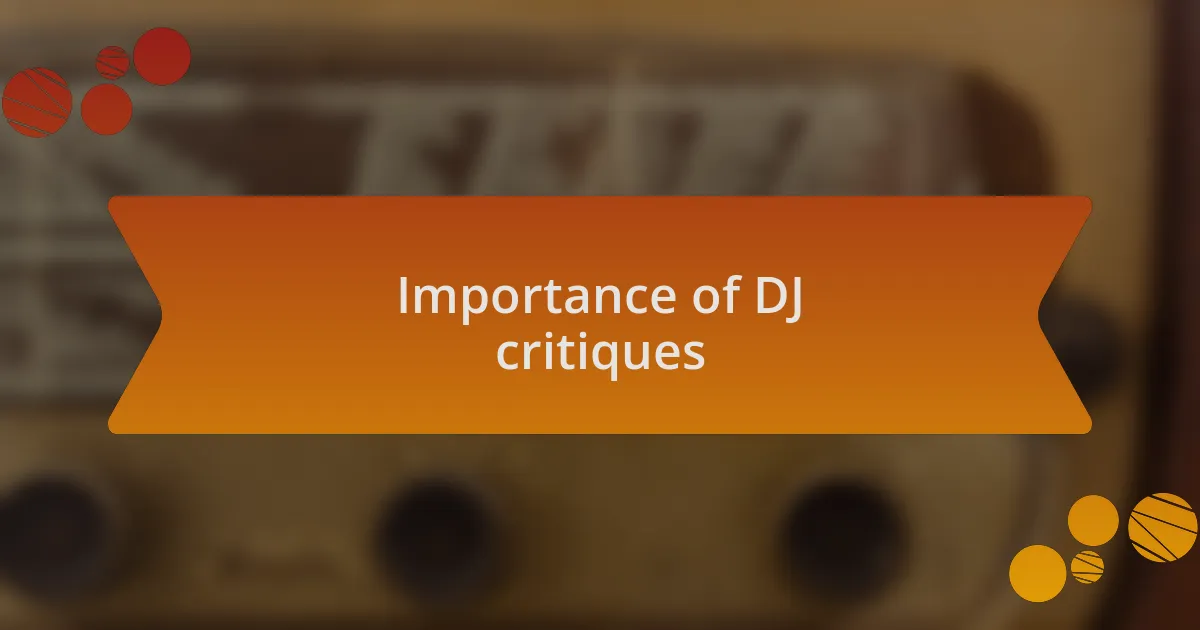
Importance of DJ critiques
When I first started playing in clubs, receiving critiques from seasoned DJs felt like being thrown into the deep end. Initially, it was intimidating, but I quickly learned that constructive feedback is invaluable. Their insights sharpened my skills and opened my eyes to nuances in mixing and crowd reading that I hadn’t considered before.
One memorable critique I received shifted my perspective entirely. A DJ pointed out how my track selection could either energize or dull the room’s vibe, depending on the flow. Reflecting on that experience, I realized that understanding the audience’s energy is just as vital as technical prowess. It begs the question, how can we truly connect with the crowd if we don’t listen to their reactions?
Additionally, I found that critiques often came with encouragement, which motivated me to experiment further. I remember a night when a fellow DJ encouraged me after a rough set, suggesting I diversify my genres to keep things fresh. This camaraderie not only helped refine my style but also fostered a supportive community that I cherish in the nightlife scene. Isn’t it fascinating how feedback can shape our musical journey?
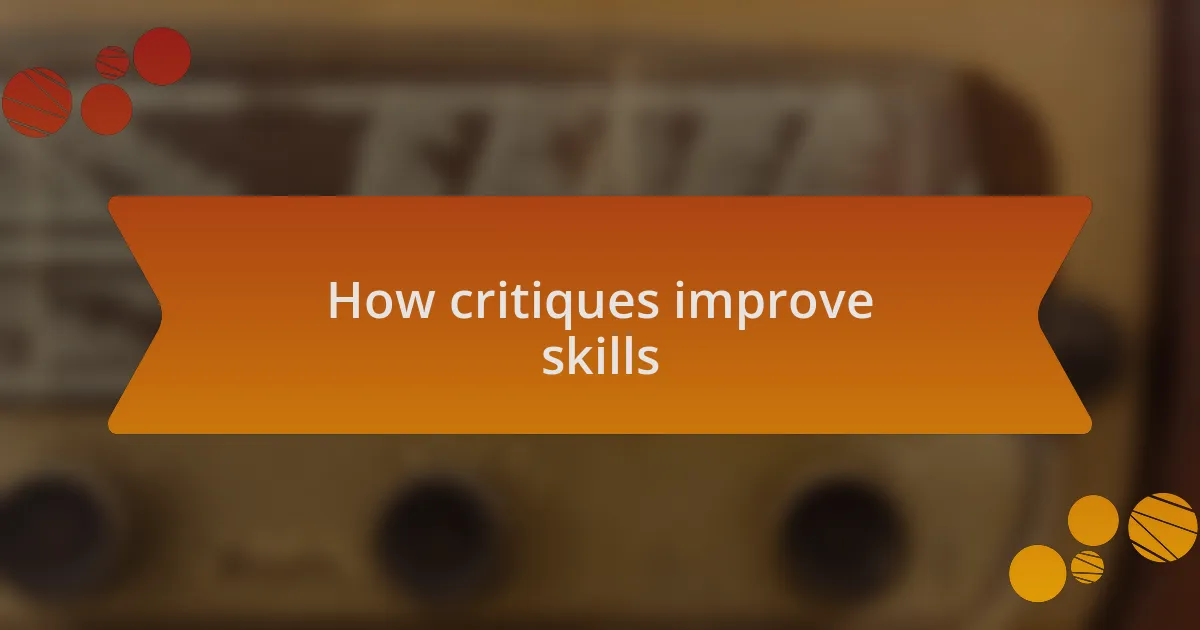
How critiques improve skills
Receiving critiques has always felt like a double-edged sword to me. One night, after a particularly rough set, a respected DJ told me my transitions were a bit jarring. At first, I felt defensive, but I took a moment to sit with that feedback. It pushed me to practice blending tracks more smoothly and ultimately elevated my entire performance. Isn’t it interesting how a single comment can ignite a transformative change in our approach to mixing?
I remember another instance where a peer pointed out that my energy fluctuated too much throughout my set. Initially, I was frustrated; I thought I had a solid flow. However, it dawned on me that my job is not just to play music but to sustain a vibe. That push to fine-tune high and low moments helped me engage the crowd more effectively. This adjustment taught me the importance of dynamic control in building that euphoric energy on the dancefloor.
Moreover, critiques have a peculiar way of unraveling self-awareness. Much like a mirror, they reflect our strengths and weaknesses. After a feedback session with a well-known DJ, I discovered that I often overlooked the subtleties of crowd interaction. This prompted me to watch how others connected with their audience. Through that process, I not only improved my skills but also developed a genuine appreciation for the art itself. How can we grow if we don’t take a closer look at our craft through the lens of others?
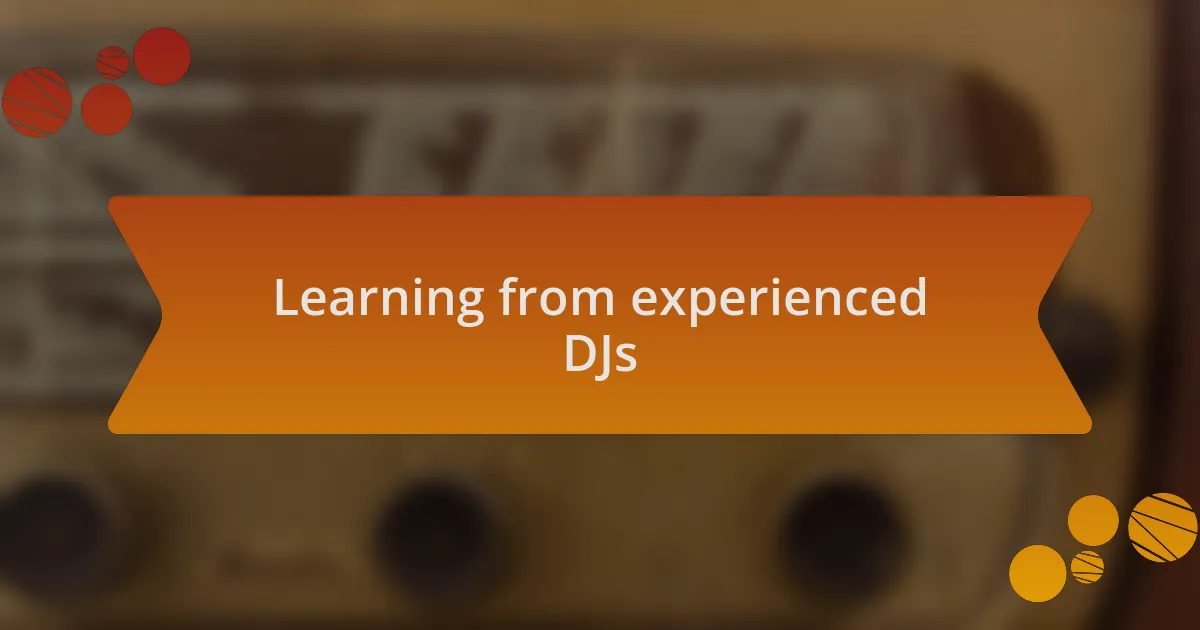
Learning from experienced DJs
There was a night when I had the privilege of watching a veteran DJ perform. As I marveled at his seamless skill, I noticed how he read the crowd with such precision. It struck me that learning from experienced DJs often goes beyond technical expertise; it involves absorbing the nuances of crowd dynamics. Have you ever considered how much we can learn by simply witnessing another artist at work?
I vividly recall my first attempt at a remix after attending a workshop led by a seasoned DJ. He invited us to dissect our favorite tracks and understand their structure. Inspired, I learned how pivotal layering sounds together can be. By observing his approach, I grew more confident in my creative choices. It’s fascinating how those moments of observation can reshape our own artistic visions, don’t you think?
Furthermore, what often resonates with me is the authenticity of experienced DJs. They have a way of blending their personal stories into their sets. I once spoke with a DJ who shared how his journey shaped his music. His passion was contagious, inspiring me to reflect on how I can weave my own narrative into my mixes. Isn’t it empowering to realize that our experiences can color the music we create?
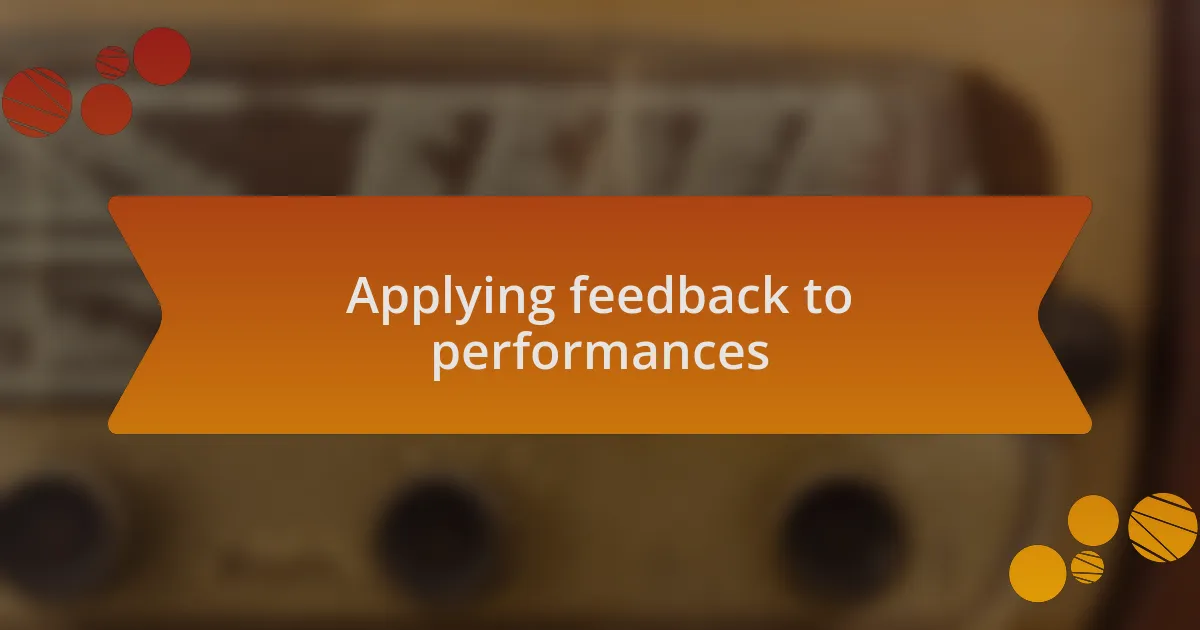
Applying feedback to performances
Feedback is an essential part of evolving as a DJ. I remember receiving a critique from a seasoned veteran after one of my sets. He pointed out the moments where I lost energy in the room and suggested incorporating more dynamic transitions. His insights gave me a clearer understanding of how to keep the crowd engaged, and I found that implementing these changes led to more electric performances. Have you ever felt that pivotal moment after realizing a simple adjustment can create a significant impact?
Applying feedback doesn’t just mean making technical changes; it’s about embracing the emotional response of my audience. After a show, one of my friends shared that they felt disconnected when I played a lengthy downtime track. This honest feedback sparked a realization for me: every song should not only fit technically but also resonate with the crowd’s vibe. I started experimenting more with upbeat tracks during those critical moments, and I noticed how it transformed the atmosphere on the dance floor. It’s incredible how feedback can lead us to new discoveries in our sets.
I’ve also learned that feedback is not always straightforward; sometimes, it requires digging deeper. I once encountered a DJ who regularly sought out constructive criticism, but what stood out was his method of reflection. He recorded sets and listened later, processing what worked and what didn’t. This practice ignited my curiosity to do the same, helping me develop a more refined ear. Have you considered how analyzing your own performances could uncover hidden potential?
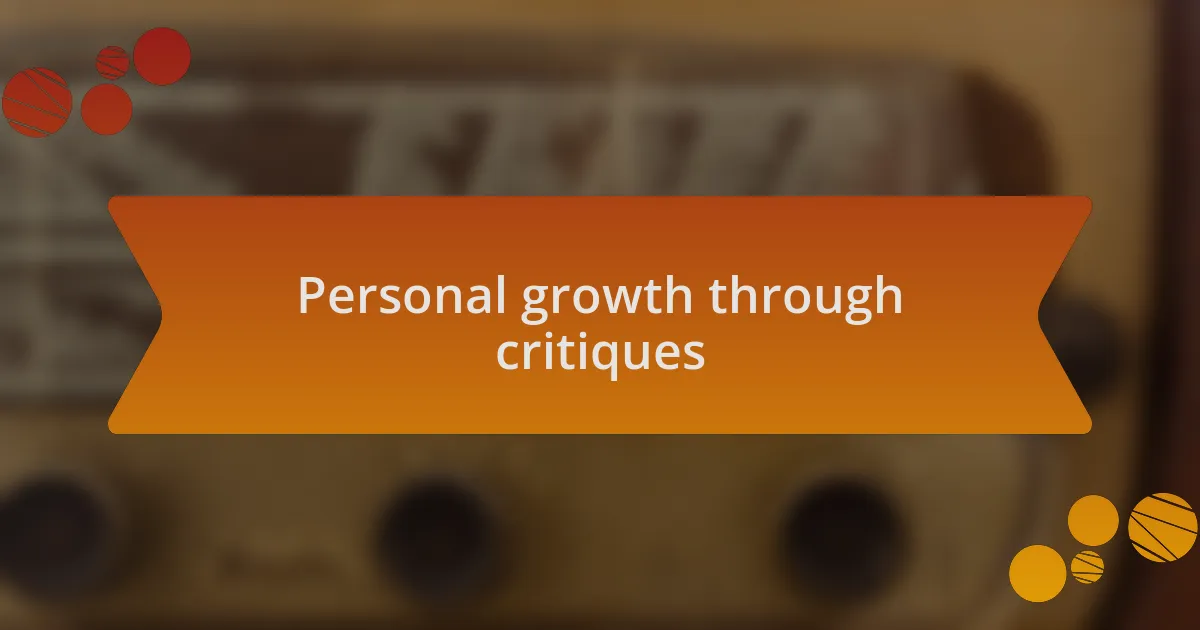
Personal growth through critiques
Critiques have a way of peeling back the layers of our performances, revealing aspects we might not notice ourselves. I recall a time when a fellow DJ pointed out my tendency to rely on familiar tracks. At first, it stung; I thought I was playing to the crowd. However, that stark realization pushed me to explore new genres and artists. Have you ever experienced that moment where discomfort leads you to a more authentic sound?
Embracing critiques can be an emotional journey. I vividly remember a late-night conversation with my mentor. He shared stories of how he faced similar challenges, feeling vulnerable when accepting feedback. Hearing his struggles made me feel less isolated. I started viewing critiques not as attacks but as invitations to grow. Have you reflected on how changing your perspective on feedback could enrich your artistic journey?
Personal growth through critiques isn’t just about honing technical skills; it’s about evolving as a creator. I often find myself re-evaluating my sets after a night out, thinking about the energy flow and audience reaction. There was a particularly memorable night when I stumbled upon a blend that had everyone dancing like there was no tomorrow. That moment reminded me of the power of listening—not just to critiques but also to the heartbeat of the crowd. What if that connection transforms your art into something truly vibrant?
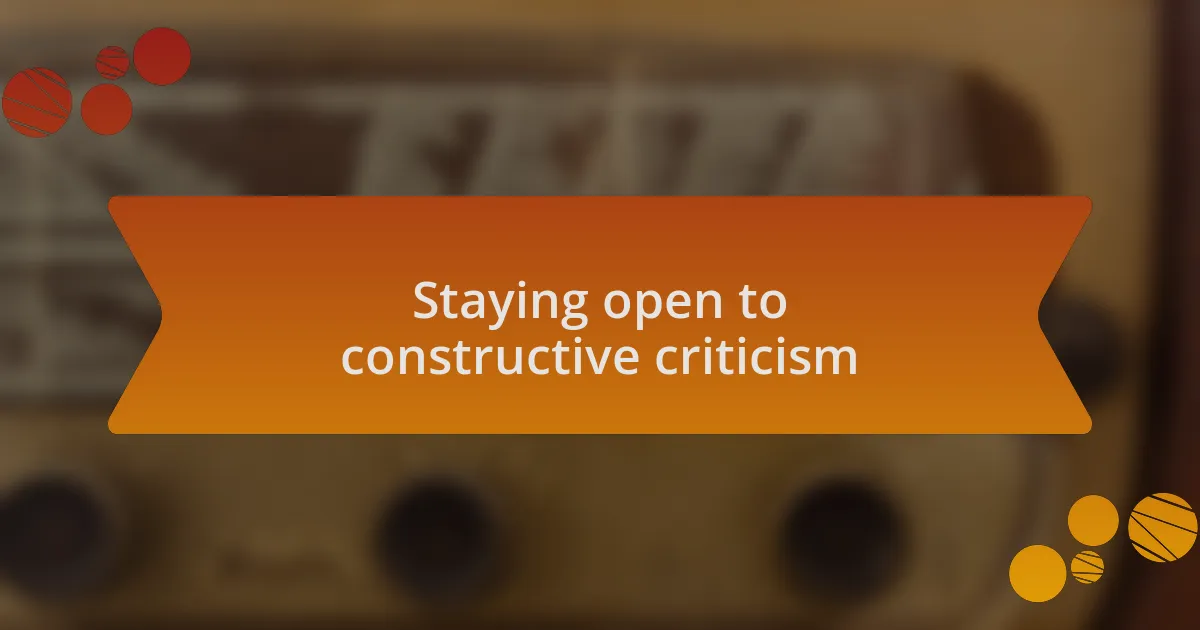
Staying open to constructive criticism
Staying open to constructive criticism can often feel like a tightrope walk between vulnerability and resilience. I remember a gig where a colleague casually remarked on my mixing technique. At first, my instinct was to defend my style, but I paused and really listened. That moment helped me realize that growth often comes through embracing feedback, even when it feels uncomfortable. Have you considered how a single, honest word can shift your entire approach?
Accepting constructive criticism requires a mindset shift. I once received pointed feedback on my track selection from a seasoned DJ at a festival. Instead of bristling, I took it to heart, choosing to analyze my choices critically. This interaction illuminated the importance of not only hearing but interpreting feedback with curiosity. What if that openness leads you to discover sounds you never imagined would resonate with your audience?
There are times when feedback serves as a mirror, reflecting what we may be blind to in our artistry. I recall a set where a friend pointed out that my transitions felt abrupt. Initially, I felt defensive, but later, as I revisited that night’s recording, I recognized the truth in their observation. That critique became a pivotal moment in refining my craft. Have you ever found that a friend’s honesty could be the key to unlocking your next great performance?